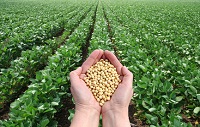New Developments in Biobased Metalworking Fluids
 “Biobased” is a BUZZ word today in Metalworking Fluid Industry. What does it mean exactly? The U.S. Department of Agriculture defines Biobased this way: “A product determined by the Secretary (of Agriculture) to be a commercial or industrial product (other than food or feed) that is composed, in whole or in significant part, of biological products or renewable domestic agricultural materials (including plant, animal and marine materials) or forestry materials."
“Biobased” is a BUZZ word today in Metalworking Fluid Industry. What does it mean exactly? The U.S. Department of Agriculture defines Biobased this way: “A product determined by the Secretary (of Agriculture) to be a commercial or industrial product (other than food or feed) that is composed, in whole or in significant part, of biological products or renewable domestic agricultural materials (including plant, animal and marine materials) or forestry materials."
To keep up with the growing demand for metalworking fluids that are made from renewable resources, formulators are developing Biobased products that in many cases perform as well or better than conventional MWFs at a comparable price. In the case of Biobased MWFs, the basestock is most likely soybeans, rapeseeds (canola), sunflowers or corn. When selecting the best vegetable basestock, there are several factors that need to be considered: end-use application of the product, oxidative stability, saturation level and additive selection. Biobased MWF has many advantages like greater viscosity stability, better lubricity, higher flash, fire and smoke points. On the other side of the coin, it won’t be easy for formulators to overcome challenges like poor oxidative stability, poor hydrolytic stability, microbial growth promotion, warranty issues and higher costs.
STLE talks more about New Developments in Biobased Metalworking fluids in their article.


